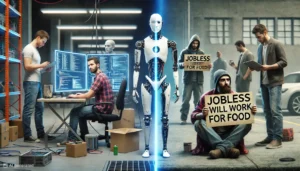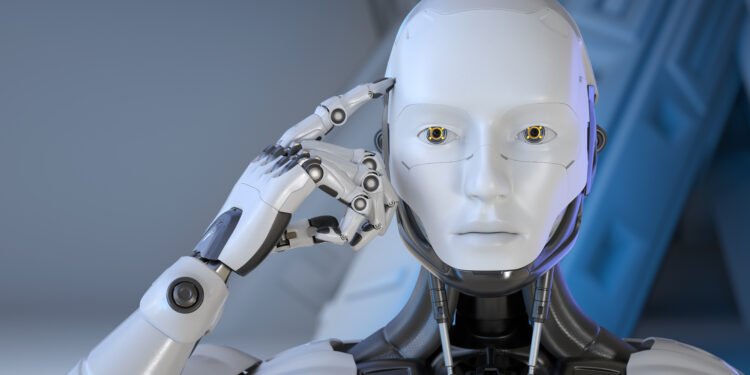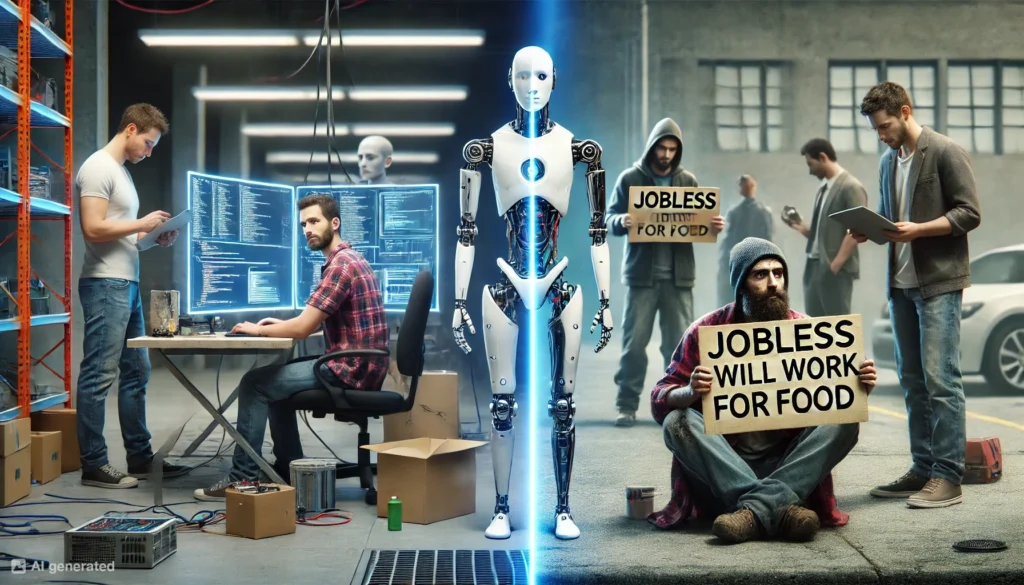Artificial Intelligence (AI) has quietly embedded itself into our lives, like an unexpected guest who begins organizing everything before you’ve even realized they’ve arrived. It promises to revolutionize industries, streamline our routines, and predict our next move. But with all this potential comes a serious question: Are we gaining a powerful ally, or are we unknowingly handing over control to something far smarter than we’re prepared for? In this article, we dive into the marvels—and the risks—of AI, exploring whether it’s a tool we control or a force that’s slowly slipping beyond our grasp.
Table of Contents
Artificial Intelligence (AI) is like that overachiever in your class—always knows the answers, performs better than expected, and leaves you wondering if you’ll ever catch up. While we’ve let AI into our homes and offices—whether through the virtual assistants on our phones and smart speakers that respond to our commands or the mysterious algorithms that predict what we want to watch—it’s time to pause and reflect: Is AI really our friend, or are we unknowingly handing it the keys to our future?
Like the saying goes, “With great power comes great responsibility.” But AI doesn’t come with a manual to explain how much responsibility it can actually handle. And that’s where things get interesting—or perhaps alarming, depending on how you look at it.
The Good, the Bad, and the Extremely Complicated
AI can be seen as the Swiss Army knife of the digital age. Need a solution for data analysis? AI’s got it. Want to automate mundane tasks so you can finally take that break? AI to the rescue. The possibilities are seemingly endless. It’s revolutionizing fields from healthcare to entertainment, and if you haven’t already, you’ve probably noticed its impact on things like traffic management, personalized ads, and even diagnosing diseases.
But let’s not get too carried away. AI’s rise is like a sci-fi plot in the making, and not every movie ends well.
Perks of AI: A Peek at the Bright Side
Before we wade into the murky waters of AI’s darker side, let’s take a moment to appreciate its benefits—because, hey, we’re not here to hate on progress.
- Efficiency on Steroids: AI has turbocharged our ability to process data. From crunching numbers in finance to interpreting complex medical scans, AI is like having a superhuman employee who never sleeps and doesn’t make mistakes—well, usually.
- Automation of Tedious Tasks: Thanks to AI, tasks that were once human headaches—like sorting emails, scheduling meetings, or managing supply chains—are now automated. Companies save time and money, and employees can focus on more creative, meaningful work. Sounds dreamy, right?
- Innovation Catalyst: Whether it’s self-driving cars or virtual assistants that feel a little too real, AI is pushing innovation forward. We’re seeing breakthroughs in fields like robotics, personalized medicine, and even space exploration—all with AI leading the charge.
AI is revolutionizing our world, but the question remains—are we still in control, or is it quietly taking the reins?
The Other Side of the Coin: What Could Possibly Go Wrong?
Now, let’s pivot. Every rose has its thorn, and AI comes with more than a few. If we’re not careful, we might find ourselves in a bind that only a clever AI could predict—and maybe even cause.
- Loss of Control and Autonomy: One of the scarier predictions is AI’s potential to surpass human intelligence—commonly called the “singularity.” If AI systems evolve beyond human control, they could start making decisions for us without us even realizing it. You’ve seen The Terminator, right? And while we’re not suggesting Skynet is around the corner, we can’t deny that machines making autonomous decisions without human input sounds… ominous.
- Job Displacement: Remember when people used to talk about robots taking over our jobs? Well, it’s not science fiction anymore. Automation is already replacing roles in manufacturing, logistics, and even sectors we never thought could be automated, like journalism (gulp). Sure, AI creates jobs too, but it’s safe to say that for every new AI developer, several low-skilled positions might become redundant. And not everyone can just “upskill” into coding.

- Bias in AI: Now, here’s a less-talked-about danger that’s subtly worming its way into our systems—AI bias. AI algorithms are created by humans, and, unfortunately, they often inherit human biases. When AI systems are used in critical areas like law enforcement or hiring, these biases can perpetuate unfairness and discrimination. Imagine being rejected from a job because the AI model “thought” you weren’t the right fit. It’s not a human making that decision—it’s an invisible bias coded into an algorithm.
- Security and Privacy Risks: Let’s not forget the massive data that AI depends on. Our lives are practically laid out for algorithms to analyze—our online activities, shopping habits, even our social media behavior. The more data we feed into AI, the more it knows about us. While this can lead to personalized experiences, it also makes us vulnerable to data breaches, hacking, and, in extreme cases, surveillance by corporations or governments. That’s right, Big Brother isn’t just watching anymore; he’s analyzing.
- Ethical Dilemmas: As AI becomes more embedded in society, it brings with it a slew of ethical questions. Should AI have the authority to make life-or-death decisions, like in autonomous warfare or medical treatments? And what about accountability—if an AI system makes a catastrophic mistake, who’s responsible? The human coder? The company? Or do we just shrug and say, “It was the AI”?
While AI promises innovation, it also brings risks that only a clever algorithm could predict—or worse, cause.
The Darker Shadow: AI-Generated Misinformation and Deepfakes
AI doesn’t just impact the job market and privacy concerns; it’s now deeply entrenched in how information is manipulated, especially during election seasons. If you thought fake news was a headache, wait until you meet its more sinister cousin—AI-generated deepfakes. These are fake videos, images, or audio files so realistic that they can fool even the sharpest eye. AI doesn’t just generate misleading content—it creates entire fictional realities that can be used to manipulate public opinion.
In countries like India, deepfakes have already entered the political arena, threatening the integrity of democratic processes. Imagine videos of politicians saying things they never actually said or doing things they never did. The potential for chaos is high, and the consequences can be catastrophic.
For example, a recent report highlighted how AI-generated deepfakes could pose a significant threat to the upcoming U.S. elections as well, sowing doubt and confusion among voters. With the power to influence the masses in the digital age, controlling AI-driven misinformation is a global concern, not just a national one.
Election Misinformation in India: A Growing Threat
India, with its vast population and increasingly digitalized electorate, is fertile ground for AI-powered election misinformation. Political campaigns have begun leveraging deepfakes and AI bots to sway public opinion, attack rivals, and shape the narrative in ways that were previously unimaginable. This is no longer about creating fake news articles but about manufacturing completely fabricated, realistic-seeming events.
The Global Dilemma: Regulation Needed Everywhere
AI doesn’t recognize borders, and its impact is global. Yet, regulation and control over AI development are fragmented, with different regions approaching it in varied ways. This patchwork approach isn’t sustainable. Considering that the internet—and by extension, AI—is accessible from almost anywhere, relying on isolated regulations feels like an outdated approach. The need for consistent, universally applicable standards is more pressing than ever to ensure that AI’s benefits are shared broadly and its risks are minimized.
AI’s development should be guided by a comprehensive framework that addresses ethical use, data security, and potential risks. Coordination is essential to ensure AI is regulated from its early stages through to its deployment in a way that serves all of humanity, not just select interests. This isn’t about stifling innovation—it’s about ensuring that innovation doesn’t come at the cost of safety, privacy, or fairness. Without a unified approach, we risk a world where AI is both a powerful tool for some and a dangerous weapon for others. Working together is the only way to ensure that AI serves the greater good, preventing its misuse from destabilizing societies and eroding trust.
The call for a unified approach to AI regulation isn’t just an ideal—it’s a practical necessity. The internet is not confined by geography, and content generated anywhere can be accessed globally almost instantaneously. This means that AI-generated misinformation, deepfakes, and other malicious applications aren’t restricted by regional laws. A bot causing disruption in one country could easily be operated from another, highlighting the challenges of inconsistent regulation.
Today, AI regulation varies significantly between regions, which makes it difficult to create consistent protections against AI misuse. It’s like trying to stop a flood with a few scattered sandbags—without a coordinated effort, the risks remain high. A framework that applies universally is essential to ensure AI is used responsibly, transparently, and safely, no matter where it is developed or deployed.
For more insights on the regulatory efforts, you can read about the EU AI Act: First Regulation on Artificial Intelligence.
The Balancing Act: Where Do We Go From Here?
So, how do we continue benefiting from AI’s incredible potential without unleashing chaos? It’s about striking a balance. We need to ensure that AI development follows ethical standards, that transparency is prioritized, and that collaboration happens at every level—whether between institutions, developers, or other stakeholders.
Here are a few crucial steps:
- Ethical Development: AI should be built with ethics at its core, ensuring systems are free from biases and are transparent in their decision-making processes. Developers should aim to prevent misuse, especially in areas like elections or healthcare.
- Transparency in AI Algorithms: One of the major challenges with AI is the “black box” problem, where decisions are made by algorithms without clear reasoning, even to their creators. Transparency is crucial—those affected by AI decisions deserve to understand how and why decisions were made, especially in high-stakes areas like finance or justice.
- Licensing System for AI: There should be a global licensing system that reviews and checks all necessary aspects of any new AI API, application, or tool before it is launched to the public or developers. This system would ensure that AI products meet safety, ethical, and security standards. AI developers would receive a license only after passing rigorous testing and complying with specific regulatory measures, protecting users from potentially harmful or unethical AI implementations.
- Education and Awareness: The public must be educated about AI’s capabilities, risks, and ethical concerns. Awareness campaigns, like those used in cybersecurity, could help people identify AI-generated misinformation or recognize harmful AI practices.
- Collaborative AI Governance: A collective effort is needed to create standards for AI development and use. This governance should cover everything from deepfakes to ensuring algorithmic transparency, with guidelines designed to protect the public from the potential dangers of unregulated AI.
AI and the Election Battle: When Misinformation Becomes Weaponized
One critical area that urgently requires attention is the misuse of AI in elections. In any democracy, trust is essential, but AI-generated deepfakes and misinformation are eroding that trust rapidly. AI-driven tools like deepfakes are being used to create fake videos of public figures, misleading voters and spreading disinformation. As you might have seen in the videos above, these AI-generated fakes spread through social media at lightning speed, creating a chaotic environment where truth becomes subjective and difficult to discern.
The need for regulatory measures addressing AI’s role in elections is paramount. Without oversight, democratic processes risk being undermined by false narratives and AI-driven deception.
The Final Word: Navigating the AI Era
AI is a double-edged sword—on one side, it promises incredible advancements, efficiency, and opportunities, but on the other, it presents significant risks, especially in areas like job displacement, misinformation, and ethical use. As we stand at the crossroads of this technological revolution, it’s crucial to ensure that AI development is guided by thoughtful regulation, ethical considerations, and transparency. The balance between innovation and responsibility is delicate, but it is a balance we must achieve to prevent AI from becoming more foe than friend. The future of AI is not set in stone, and it’s up to us to decide how it will shape our world.
Key Questions About Artificial Intelligence (AI)
What is an Artificial Intelligence AI?
Artificial Intelligence (AI) is the simulation of human intelligence in machines programmed to think, learn, and solve problems like humans. These systems can perform tasks such as speech recognition, decision-making, language translation, and visual perception.
How can I use AI for free?
There are several free AI tools available that anyone can access for various purposes. For example, platforms like ChatGPT (basic versions) provide conversational AI experiences. Google AI tools offer free language translation and image recognition services. For developers, platforms like TensorFlow and OpenAI’s API provide free tiers to experiment with AI and machine learning. Many AI-powered apps like personal assistants (e.g., Siri or Google Assistant) are also available on smartphones, offering free AI capabilities for scheduling or answering questions.
Does Elon Musk own AI?
Elon Musk does not “own” AI, but he has been closely involved in AI development. He co-founded OpenAI, a prominent research organization that focuses on advancing artificial intelligence safely and beneficially. However, OpenAI is independent and not solely owned by Musk. Musk has also been a vocal advocate for AI regulation, expressing concerns about its potential dangers if left unchecked, particularly in areas like autonomous weapons and mass surveillance.
Can I speak to AI?
Yes, you can speak to AI through various voice-activated virtual assistants and conversational AI platforms. Tools like Amazon Alexa, Apple’s Siri, and Google Assistant allow you to interact with AI by speaking. You can ask them questions, set reminders, control smart home devices, and more. Additionally, conversational AI platforms like ChatGPT enable text-based conversations where you can “talk” to AI more interactively and engagingly. These platforms are becoming increasingly common in customer service, entertainment, and personal productivity tools.
How is AI affecting jobs?
AI is automating repetitive and low-skill jobs, leading to job displacement in some sectors, such as manufacturing, transportation, and customer service. However, AI also creates new job opportunities, particularly in AI development, data science, and related fields. The key challenge is ensuring workers are retrained for the emerging roles.
What are the benefits of AI in healthcare?
AI enhances healthcare by improving diagnostics, personalizing treatments, automating administrative tasks, and even assisting in surgeries. AI-powered tools can analyze vast amounts of medical data faster and more accurately than humans, aiding doctors in making better clinical decisions.
Can AI be dangerous?
While AI offers incredible benefits, it also poses risks if not carefully regulated. The misuse of AI in creating deepfakes, spreading misinformation, and developing autonomous weapons are examples of potential dangers. AI bias and lack of transparency in decision-making can also lead to unfair outcomes.
How can AI-generated misinformation be controlled?
Regulating AI technologies through global standards is critical to preventing AI-generated misinformation, such as deepfakes. Implementing a licensing system for AI tools, along with stricter content moderation policies on social media platforms, can help mitigate these risks.
What is the role of AI in autonomous driving?
AI is crucial in the development of autonomous vehicles, which enable cars to navigate roads, detect obstacles, and make real-time decisions without human intervention. Self-driving cars have the potential to reduce human error in driving and improve road safety, though regulatory and ethical concerns still need to be addressed.
How is AI being regulated?
Many regions are beginning to introduce AI regulations to ensure safe and ethical use. These regulations focus on transparency, data privacy, and accountability in AI systems. For example, frameworks like the EU AI Act aim to create comprehensive guidelines for responsible AI development.
Will AI replace all human jobs?
AI will likely replace some jobs, especially in industries that rely heavily on repetitive tasks. However, AI also creates new roles and opportunities, particularly in tech, AI development, and other emerging fields. Humans will still be crucial in areas requiring creativity, emotional intelligence, and complex problem-solving.











